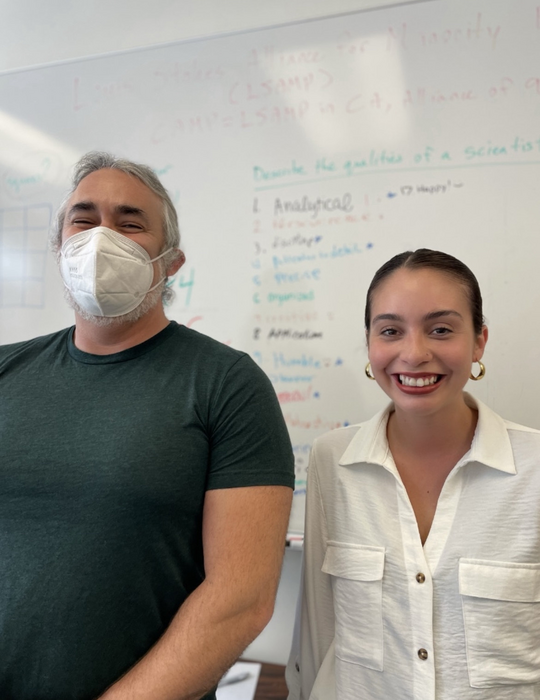RIVERSIDE, Calif. — New psychosocial stressors and widespread lifestyle changes resulted from to the COVID-19 pandemic, contributing to depression, isolation, and anxiety. Many studies have explored the impact of the pandemic on the general population’s mental health. But what about the impact on increased isolation among the growing number of older people living with HIV (OPLH)?

Credit: UC Riverside.
RIVERSIDE, Calif. — New psychosocial stressors and widespread lifestyle changes resulted from to the COVID-19 pandemic, contributing to depression, isolation, and anxiety. Many studies have explored the impact of the pandemic on the general population’s mental health. But what about the impact on increased isolation among the growing number of older people living with HIV (OPLH)?
To explore this question, a team led by scientists at the University of California, Riverside, designed a virtual village — an online space facilitating positive connections among people — to provide health, community-based, and personal resources for OPLH who are at least 50 years old. The village provides a safe space for participants to create support groups and reduce the negative effects of social isolation.
“We found the use of a virtual village can be a viable method of connecting vulnerable groups to services and to each other, and provides guidance on how to expand in future research with similar concepts,” said Jasmine Lucero López, the first author of the paper that appears in the Journal of the International AIDS Society. “We identified three key lessons on how to enhance future studies.”
The three lessons are:
- It is important to be mindful that some older populations may experience significant difficulty using newer technology.
- Interactive social events are frequently attended and requested by participants.
- Living with HIV is not enough to bond individuals.
The study had 24 participants from the Coachella Valley area, Los Angeles metro area, and Tampa Bay region. The researchers were invited last month to present the results of their study to the National Academy of Medicine.
“COVID-19 has resulted in quickly evolving studies that address unique issues, yet few focus on supporting individuals who are aging in place with HIV,” said López, an undergraduate honors student in the Department of Psychology and lead of the HIV and aging research team. “Our study reports on the pilot phase of a virtual village and provides insight into the needs of the people aging with HIV during the global pandemic.”
The researchers embedded six interventions — social mixers, a buddy system, expert presentations, resources, guided discussions, and mindful meditation — into the virtual village during the pilot period. They found social mixers, hosted biweekly, were the most attended of the interventions.
During the social mixers, many participants told the researchers that they looked forward to these social events because they promoted the formation of interpersonal relationships. Some even reported that these types of interventions enhanced a sense of community.
“Whether it was through our buddy system or Bingo nights, these interventions made it easier for participants to empower one another,” López said. “Our proposed social interventions not only assisted with the creation of a virtual village, but also facilitated friendships that extended into in-person meetings.
Brandon Brown, who advises López, explained that older people living with HIV are at a high risk of facing dangerous symptoms of COVID-19, which are attributed to age factors and being immunocompromised.
“This population has adhered to more strict isolative guidelines,” said Brown, a professor of social medicine, population, and public health in the School of Medicine. “This social isolation has negatively impacted psychological well-being, which directly influences the overall health of an individual. Mental health comorbidities and AIDS survivor syndrome further intensify the detrimental impact of isolation during a pandemic. For these reasons, it is essential to explore new methods to connect vulnerable populations in a manner that prioritizes the improvement of quality of life. We hope our study leads to an expansion of networks and enables this community to connect on a more widespread scale.”
According to Brown, virtual villages have gradually gained popularity, especially during the past decade with increased accessibility to the internet through mobile and other devices.
“We chose the topic of HIV for this particular virtual village project due to research and advocacy focus of our team, but our process of co-creating a virtual community can be replicated for any health or social topic,” he said. “As long as there is a common identity and evidence of community cohesion, we believe a virtual village can be useful to bring people together and supplement or even facilitate in-person activities.”
Brown and López were joined in the study by researchers at UC Merced; UC San Diego; University of South Florida; Northeastern University, Mass.; and HIV + Aging Research Project – Palm Springs, Calif.
The research was supported in part by a grant from Merck Sharp & Dohme Corp and the National Institutes of Health.
The research paper is titled “Lessons learned in co-creating a Virtual Village for people ageing with HIV.”
The University of California, Riverside is a doctoral research university, a living laboratory for groundbreaking exploration of issues critical to Inland Southern California, the state and communities around the world. Reflecting California’s diverse culture, UCR’s enrollment is more than 26,000 students. The campus opened a medical school in 2013 and has reached the heart of the Coachella Valley by way of the UCR Palm Desert Center. The campus has an annual impact of more than $2.7 billion on the U.S. economy. To learn more, visit www.ucr.edu.
Journal
Journal of the International AIDS Society
DOI
10.1002/jia2.26084
Method of Research
Survey
Subject of Research
People
Article Title
Lessons learned in co-creating a Virtual Village for people ageing with HIV.
Article Publication Date
23-May-2023
COI Statement
All authors declare no competing interests related to this work.




